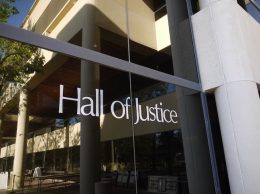Dubroff: Companies play let’s make a deal but they don’t always win

Henry Dubroff
There’s no question that the current wave of corporate mergers is reshaping big chunks of the corporate landscape on the Central Coast.
But all mergers are not created equal and history suggests that more than half of mergers involving large publicly traded companies don’t really work out at all.
For a look at what’s working and what’s not working in the current M&A environment, I’m going to focus on two mergers that made news in early March.
One involves a company that’s been in one of the highest profile deals in recent memory; the second involves a company you’ve probably never heard of.
It was with huge fanfare in 2015 that Norwalk, Conn.-based Frontier Communications Corp. closed a transformative deal to pay $10.5 billion for Verizon’s landline and broadband operations in California, Texas and Florida.
Along with the deal came the acquisition of Verizon’s high profile headquarters in Thousand Oaks and phone lines serving thousands of customers along the Central Coast.
Some of us with grey hair will remember the legacy GTE systems that wound up with Verizon in the last big telecom merger wave.
Frontier’s Verizon deal has hit a rough patch lately with company shares tumbling 5 percent on March 7 after it announced a Q4 loss of $133 million despite a 70 percent gain in revenue thanks to the Verizon purchase.
With its stock roughly halved to around $2.50 per share over the past year, Frontier’s current dividend yield is a whopping 15 percent, a sign that Wall Street doesn’t believe Frontier will be able to maintain the payout over the long haul.
CNBC’s Jim Cramer is one of those who doesn’t think the dividend is sustainable.
It may be that Frontier’s big bet on the Verizon systems will pay off in the long run and shareholders who stick around may be richly rewarded. Frontier Communications shares (Symbol: FTR) still trade well below the company’s stated book value, according to Yahoo Finance data.
But with so much attention being paid to mobile and with cord cutting an increasing trend, Frontier Communications has a lot of work to do to get back on track.
Meanwhile, Dubuque, Iowa-based Heartland Financial has entered the tri-county banking business with barely a ripple.
That’s partly on purpose. Heartland has become an $8 billion asset company by sticking with a well-defined line of banking and insurance products to consumers and small to medium-sized businesses.
It likes to retain the local name on banks it acquires and keep local management in place with most merger-related cost cutting happening in operations and technology.
On March 1, Heartland closed the acquisition of Founders Community Bank in San Luis Obispo, which will operate under the banner of its Fresno-based Premier Valley Bank operation. (Premier Valley is not related to Pacific Premier Bank, whose parent is in the process of acquiring Heritage Oaks Bancorp. in Paso Robles.)
I learned about Heartland because a friend from Colorado told me about its acquisitions in the Denver area, where it has purchased several banks in recent years.
Heartland Financial (Symbol: HTLF) uses a mix of cash and stock for its mergers and it has achieved a strong 11.45 percent return on equity.
It pays out a dividend of less than 1 percent, retaining the bulk of its earnings to fuel more expansion; its shares have been trading close to a 52-week high at $50.75 recently.
While some people are questioning the future of bricks-and-mortar branches in a digital age, the bank prefers small to medium-sized communities and a simple strategy, with an increased focus on acquiring banks in the West. Recent acquisitions were in Scottsdale, Ariz. and Santa Fe, N.M.
Mergers come in all sorts of flavors.
Will Frontier Communications’ big bet on Verizon’s operations win in the long run? Will Heartland Financial’s string of small deals continue to pay off?
For now, Wall Street is handsomely rewarding Heartland’s steady growth strategy.
• Reach Editor Henry Dubroff at [email protected].












